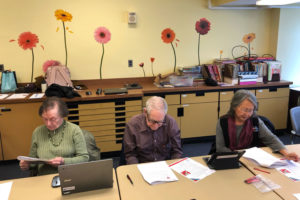 A recent study suggests these classes could be increasingly important. Researchers at Princeton and New York universities found that Facebook users 65 and over posted seven times as many articles from fake news websites, compared with adults under 29.
A recent study suggests these classes could be increasingly important. Researchers at Princeton and New York universities found that Facebook users 65 and over posted seven times as many articles from fake news websites, compared with adults under 29.
"People who are not digital natives didn't grow up online, having a sort of a natural relationship to using computers and the Internet," he says. "They are simply more susceptible to the kinds of online content that happened to be weaponized in that particular election.
"If we were standing in line in the supermarket, and we saw a tabloid," she says, "people in my generation know what that means, but if we see something online, the traditional cues we're used to are not present."
Nash says confirmation bias, the tendency to interpret new information in a way that confirms prior beliefs, can also get stronger with age.
Isolation can be a factor, too...
At the Schweinhaut Senior Center, trainer Bre Clark coaches participants about the difference between propaganda, deep fakes and sponsored content. And she runs through a checklist for evaluating information online: Who wrote the information? What's the source of a claim? Does the author have an agenda?
See the full story here: https://www.npr.org/2020/02/26/809224742/with-an-election-on-the-horizon-older-adults-get-help-spotting-fake-news